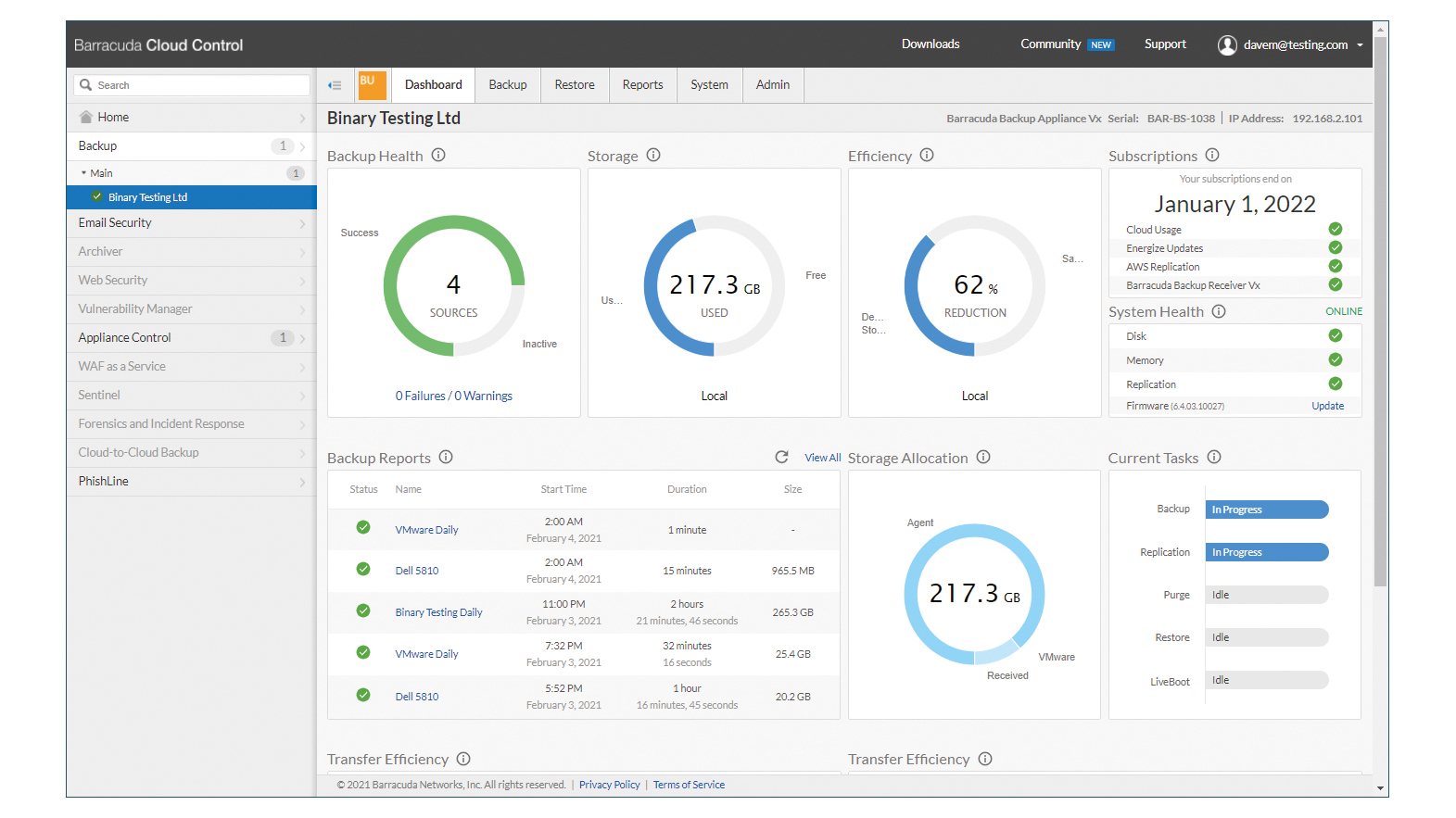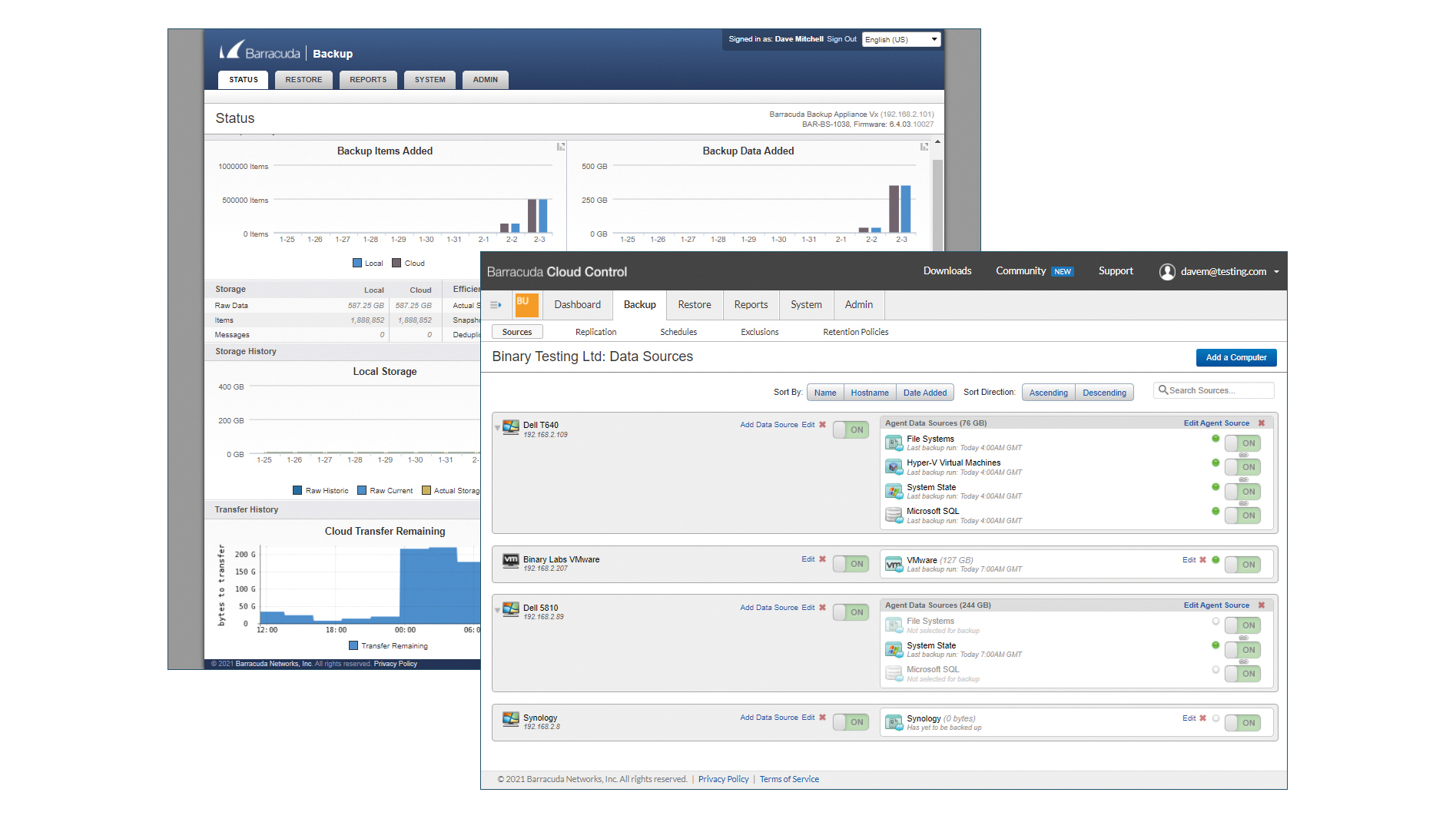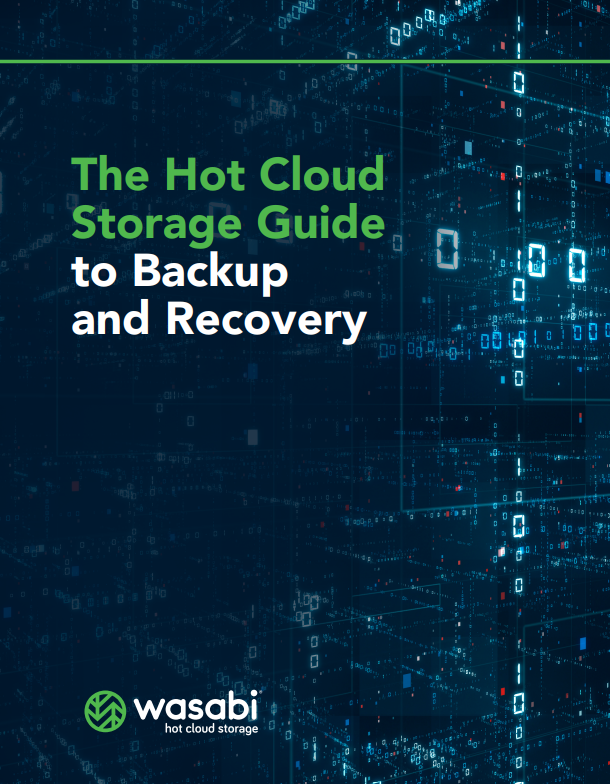Barracuda Backup Vx review: Hassle-free hybrid backup
A virtual on-premises appliance that’s a breeze to manage

-
+
Outstanding cloud integration
-
+
Seamless VM support
-
+
Easy-to-use cloud console
-
-
No remote worker support

It’s great to have a single solution that manages both local and cloud backup – and Barracuda’s Backup platform adds site-to-site replication too, making it ideal for multi-office businesses. It runs on a range of standalone backup appliances, but you can also get it as a virtual server for both VMware and Hyper-V.
We tried out the latter and found that installing the VM took just ten minutes. We were then easily able to register the virtual appliance to our account by logging into the cloud portal and entering its unique code.
Pricing for virtual host backup is based on sockets: our dual-socket Hyper-V hosts required a total of four licences, while physical Windows servers required a single licence each, regardless of their socket count, with no extra charge for the Exchange and SQL Server apps running on them.
Cloud storage is bought separately, with a 1TB chunk costing £807 per year. Whatever storage you buy is instantly linked to your account and made available to the appliance.
Client deployment is supremely simple because Barracuda provides one agent for all Windows systems and applications. Note, though, that this doesn’t handle remote access, so homeworkers will need to connect to the office network over a VPN.
With the agents installed, we used the cloud console to declare our test systems as backup sources; enabling cloud replication simply requires ticking a box. Protecting our VMware host was even easier: we were immediately able to browse its VMs and choose which ones to back up.

If you’re running local Exchange services, you can secure your mailbox database just by adding the host. Message-level backups require a dedicated Exchange service account and a management shell command to enable impersonation rights, but this isn’t difficult to set up thanks to clear documentation.
Sign up today and you will receive a free copy of our Future Focus 2025 report - the leading guidance on AI, cybersecurity and other IT challenges as per 700+ senior executives
You can set a global backup schedule or individual schedules for particular groups and hosts. Jobs can run as frequently as every 15 minutes, and after the initial full backup Barracuda takes an “incremental forever” approach to keep things quick and compact. Block-level deduplication is automatically applied to really help you make the most of your storage.
After we’d defined our hosts and schedules, our jobs automatically spun up at the appointed time, and set about copying data to the appliance and replicating it to the cloud. For site-to-site replication, you simply register a second Barracuda backup appliance and select it as a replication destination in your backup jobs.
RELATED RESOURCE

The hot cloud storage guide to backup and recovery
What is cloud object storage, why is it on the rise, and what option should you choose?
Recovery is handled via the portal’s restore window, from which you can browse all your backup sources. You can choose the Restore option to retrieve files and folders from the appliance, or use the Download option to get them from the cloud. Selecting our Exchange backup allowed us to view all users and recover anything from a single email to a complete mailbox.
As for server backups, you can use the LiveBoot feature to restore entire VMs back to their host, or use the Cloud LiveBoot service to bring up a VM backup in Barracuda’s cloud and access it via a VNC viewer.
Through it all, the cloud portal provides plenty of information about backup and appliance health, local and cloud storage, backup job status and active tasks. You can also check up on how much space the appliance has saved through deduplication, using either the cloud dashboard or the local web console.
Since Backup Vx lacks explicit support for remote workers, it might not be a perfect fit for businesses that have fully embraced working from home. However, it’s quick to deploy and seamlessly integrates local and cloud backup, so if you’re looking for an on-premises hybrid backup solution it’s a very attractive option.
Dave is an IT consultant and freelance journalist specialising in hands-on reviews of computer networking products covering all market sectors from small businesses to enterprises. Founder of Binary Testing Ltd – the UK’s premier independent network testing laboratory - Dave has over 45 years of experience in the IT industry.
Dave has produced many thousands of in-depth business networking product reviews from his lab which have been reproduced globally. Writing for ITPro and its sister title, PC Pro, he covers all areas of business IT infrastructure, including servers, storage, network security, data protection, cloud, infrastructure and services.
-
 "We want AI to work for Britain": The UK government wants to upskill 10 million Brits in AI by 2030 – and the courses are free to access
"We want AI to work for Britain": The UK government wants to upskill 10 million Brits in AI by 2030 – and the courses are free to accessNews The nationwide upskilling push aims to help UK workers capitalize on the generative AI boom
By Ross Kelly Published
-
 Everything we know so far about the Nike data breach
Everything we know so far about the Nike data breachNews Hackers behind the WorldLeaks ransomware group claim to have accessed sensitive corporate data
By Ross Kelly Published
-
 Business leaders are using AI as a “license to reduce headcount” – new Morgan Stanley research lays bare the impact on UK workers
Business leaders are using AI as a “license to reduce headcount” – new Morgan Stanley research lays bare the impact on UK workersNews Analysis of five sectors highlights an "early warning sign" of AI’s impact on jobs
By Nicole Kobie Published
